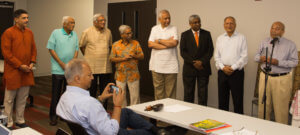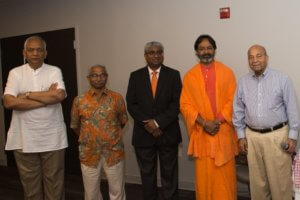
There is a clear need for a scholar with a warrior, historical and dharma consciousness to reverse miseducation in Hindu civilization and dharma.
The academy is where Knowledge is manufactured and distributed, vertically and horizontally. Words and images are crafted to communicate meaning that creates information that leads to Knowledge that culminates in privileged meaning that diffuses as the legitimate meaning and that hopefully culminates in wisdom. In the information age, in which we live, “media” is the most powerful influence in life. The medium that is the western academy churns out “Hindu Knowledge” from a primarily etic and not emic perspective. Carter G. Woodson blamed Euro-centric curricula for miseducating or failing to educate the African American for success and a sense of self.[1] To perpetuate the miseducation of students and Hindus (for whom a teacher is a revered person) is likely to lead to some:
- developing the Stockholm syndrome
- developing low self-esteem and self-hatred, and
- having violent reactions like becoming public advocates against Hinduism.
There is a crisis in our midst, evidenced by legal action against the California State Board of Education[2] to protest miseducation in Hindu civilization and dharma. Hindus constitute the fourth largest population in the USA and are amongst the most highly educated and highly paid. In the USA, Hindus have the highest retention rate in remaining Hindu.[3] The story of Bobby Jindal and Nikki Haley who were Hindu and Sikh, respectively, and who took to high profile affirmation of their conversion to evangelical Christianity on US political platforms demonstrates the pressure to ‘belong’ to the Christian world in order to progress in the USA. What are the implications for Hindu children who become highly successful and wish to participate fully in public life? There is a clear need for a scholar with a warrior, historical and dharma consciousness to reverse miseducation in Hindu civilization and dharma.
Some scholars ridicule any Hindu challenge to curricula in the academy and label challengers as ‘hindutva’, fundamentalists, and fanatics. Others defend academic freedom, and some swear by excellent scholarship. American campuses characteristically have not facilitated free speech, prompting US President Trump in 2019 to issue an executive order on free speech.[4] New space has therefore opened up for Hindus to continue lobbying for their views. While Hindus do not have a penchant for protest, revering the teacher as a guru, Hindu Americans have learned how to engage in this aspect of the American way of life.
Then, there is the factor of big business and big donations to the academy. Publishers and distributors and donors wish to protect their interests – that, at times, could be at variance with a Hindu agenda for better representation in the academy. Hindus have to negotiate this track.
It is to the credit of several young Hindus in academia that they have already found their legs in protesting within the American system. The Hindu American Foundation is one activist group that grew out of academia and the intellectual/Kshatriya motivation. Also, many Hindu-Americans from the non-Humanities area have been equipping themselves to enter this battleground. Such activists serve as role models today.
The interface between western colonialism/imperialism and the colonized has been oppressive and devastating – economically, politically, culturally and psychologically – to the colonized. Today, we live in a postcolonial present, viewing the world through the lenses shaped, according to Foucault, by the power-knowledge and discursive manifestation of Knowledge.[5]
Cohen had preceded both Michel Foucalt and Edward Said in linking knowledge- power and the impact on colonial discourses. He identified new categorizations of cultural forms that created a dichotomy between colonizers and colonized, European and Asian, modern and traditional, West and East. Language, archaeological memories and religious texts were used to transform India “every bit as powerful as the better-known consequences of military and economic imperialism.”[6] The trend continues in the American academy.
In conclusion, a useful Hindu theoretical framework can utilize Devi Saraswati (Shakti and the incarnation of the Highest Reality as Knowledge, Music and the Arts). To the Hindu, Knowledge should not be manipulated. That such Knowledge might be necessary for career advancement is equally, if not more abhorrent, to the Hindu who worships Knowledge. The scholar/warrior, therefore, is the catalyst for re-installing Devi Saraswati in the academy for preserving and transmitting the wisdom of the Hindu civilization and dharma across the globe.
Notes
[1] Carter Godwin Woodson and Marcus Harrison Green, The Mis-Education of the Negro (Seattle, WA: Vert Volta Press, 2018).
[2] For more see “California Curriculum Reform,” Hindu American Foundation, accessed May 15, 2020, http://www.hinduamerican.org/california-textbooks-overview.
[3] Michael Lipka, “Jindal Followed a Rare Path, from Hinduism to Catholicism,” Pew Research Center (Pew Research Center, June 24, 2015), https://www.pewresearch.org/fact-tank/2015/06/24/jindal-followed-a-rare-path-from-hinduism-to-catholicism/.
[4] Susan Svrluga , “Trump Signs Executive Order on Free Speech on College Campuses,” The Washington Post, March 21, 2019, https://www.washingtonpost.com/education/2019/03/21/trump-expected-sign-executive- order-free-speech/.
[5] White Fuse Media Ltd, “Power/Knowledge,” Social Theory Rewired, accessed May 15, 2020, http://routledgesoc.com/category/profile-tags/powerknowledge. See White Fuse Media Ltd for more.
[6] Nicholas B Dirks, “Colonialism and Its Forms of Knowledge the British in India,” in Colonialism and Its Forms of Knowledge:the British in India (Princeton, NJ: Princeton Univ. Press, 2006), p. ix.
Bibliography
Blaut, James M. The Colonizer’s Model of the World: Geographical Diffusionism and Eurocentric History. New York: The Guildford Press, 1993.
“California Curriculum Reform.” Hindu American Foundation. Accessed May 15, 2020. http://www.hinduamerican.org/california-textbooks-overview.
Cohn, Bernard S. Colonialism and Its Forms of Knowledge the British in India. Princeton, NJ: Princeton Univ. Press, 2006.
Curtis, Michael. Orientalism and Islam: European Thinkers on Oriental Despotism in the Middle East and India. Cambridge: Cambridge University Press, 2009. https://books.google.tt/books?hl=en&lr=&id=liJ_KxAMIJgC&oi=fnd&pg=PR7&dq=islamic+rule+in+india ots=yHBRDZihIc&sig=G5qIPFPSJBY6lOnO8rqjaGKxLJU&redir_esc=y#v=onepag e&q=%20india&f=false.
Dirks, Nicholas B. “Foreword.” Foreword. In Colonialism and Its Forms of Knowledge the British in India, ix. Princeton, NJ: Princeton Univ. Press, 2006.
“Hindu Religion Information Data and Statistics: PEW-GRF.” Pew-Templeton Global Religious Futures Project. Accessed May 15, 2020. http://globalreligiousfutures.org/religions/hindus.
Lal, Rollie, Angel M. Rabasa, Cheryl Benard, Peter Chalk, C. Christine Fair, Theodore Karasik, Ian Lesser, and David Thaler. “Islam in India,” 297–320. RAND Corporation, 2004. http://www.jstor.org/stable/10.7249/mg246af.16.
Lipka, Michael. “Jindal Followed a Rare Path, from Hinduism to Catholicism.” Pew Research Center. Pew Research Center, June 24, 2015. https://www.pewresearch.org/fact-tank/2015/06/24/jindal- followed-a-rare-path-from-hinduism-to-catholicism/.
McKnight, Scot. “Bobby Jindal, Nikki Haley and Hindu Converts to Christianity.” Jesus Creed. Beliefnet, Inc. and/or its licensors, June 24, 2010. https://www.beliefnet.com/columnists/jesuscreed/2010/06/bobby-jindal-nikki-haley-and-h.html.
Rao , Prof. S. N. Balagangadhara, and James M Blaut. “Emergence of a New
Paradigm in Hindu Studies.” Accessed May 14, 2020. https://lms.hua.edu/pluginfile.php/775/mod_resource/content/1/4.%20HUA- A%20New%20Paradigm-in-Hindu-Studies%20%284%29.pdf.
Svrluga , Susan. “Trump Signs Executive Order on Free Speech on College Campuses.” The Washington Post, March 21, 2019. https://www.washingtonpost.com/education/2019/03/21/trump-expected- sign-executive-order-free-speech/.
White Fuse Media Ltd. “Power/Knowledge.” Social Theory Rewired. Accessed May 15, 2020. http://routledgesoc.com/category/profile-tags/powerknowledge.
Woodson, Carter Godwin, and Marcus Harrison Green. The Mis-Education of the Negro. Seattle, WA: Vert Volta Press, 2018.
Cover Image Credit: https://unsplash.com/@aaronburden










